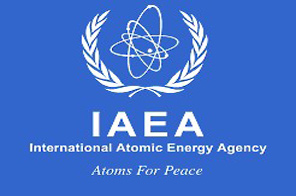World powers unite for Iran nuke
VIENNA: The UN nuclear watchdog censured Iran on Friday and demanded it immediately halt construction of a newly-revealed uranium enrichment plant as world powers united against Tehran.
Iran dismissed the move as "theatrical and useless."
China and Russia joined forces with Britain, France, Germany and the United States to push through a resolution at the International Atomic Energy Agency's board on the second and last day of its traditional November meeting.
The Western powers have long suspected Iran is trying to build a nuclear bomb but have struggled to get diplomatic backing from China and Russia.
Twenty-five nations on the 35-member board voted for the censure, which was the first against Iran since February 2006. Only Venezuela, Malaysia and Cuba voted against.
The resolution was denounced by Iran whose ambassador to the IAEA, Ali Asghar Soltanieh, said it created a "confrontational environment".
In Tehran, the IRNA news agency quoted foreign ministry spokesman Ramin Mehmanparast saying it was a "theatrical and useless" move aimed at pressuring Iran.
Russia and China, which have close links to Iran, came on board following the revelation in September that Iran had been secretly building a second uranium enrichment plant near the holy city of Qom.
Enriched uranium is used to make fuel for nuclear power plants but also the fissile material for an atomic bomb.
Moscow said it expected Tehran to "treat with all seriousness the signal contained in the resolution of the board and ensure full cooperation with the agency."
The United States welcomed the resolution as "significant."
The resolution "sends a strong signal of serious international concern about Iran's continued non-compliance to its obligations both to the IAEA and to the UN Security Council," a senior State Department official said.
The official, speaking on condition of anonymity, said the vote was the outcome of "intensive American diplomatic efforts," including "a lot a very high-level work over recent weeks."
White House spokesman Robert Gibbs added Friday, in a stern warning to Tehran, that US and international patience over Iran's nuclear program was "limited."
"Our patience and that of the international community is limited, and time is running out," he said.
"If Iran refuses to meet its obligations, then it will be responsible for its own growing isolation and the consequences."
Iran, which insists its nuclear programme is for peaceful energy purposes, has been enriching uranium at a bigger plant in Natanz for several years, in defiance of UN sanctions to halt all such activity.
In February 2006 the IAEA referred Tehran to the UN Security Council over its refusal to suspend enrichment and agree to full IAEA inspections.
The new resolution will likewise be reported to the UN Security Council in New York.
Iranian ambassador Soltanieh rejected suggestions that Tehran could deny IAEA inspectors further access to Qom, which they have visited twice since its existence was first revealed in September.
Qom was "now under IAEA safeguards and it will continue to be under the IAEA safeguards," the envoy said.
Nevertheless, there would be "natural consequences for a resolution like this because this is a hostile, unfriendly gesture," he said.
"One of the first consquences is that it will jeopardise the cooperative environment. It creates a confrontational environment," he said, adding that Tehran would now only meet its legal obligations under its safeguards agreement with the IAEA, "no more, no less."
The IAEA had brokered a deal under which Russia would lead a consortium that would enrich uranium for Iran to use in a medical research reactor.
Iran would also consider "other options" to get fuel for its research reactor, Soltanieh continued.
"We cannot wait more. Time is of the essence and therefore we have to study other options," he told reporters.
Britain said the resolution sends "strongest possible signal".
The US ambassador to the IAEA, Glyn Davies, insisted the six powers were not seeking to punish Iran.
"It's not meant to be punitive," he said. "I hope it provides further impetus on the diplomatic track."
But it was a signal to Iran that international "patience is running out," Davies said.
Israel welcomed the resolution and called for tough international sanctions should Tehran defy it.
"The passing of the resolution with a large majority shows that the international community reached the conclusion that Iran's nuclear programme... is becoming a significant and urgent threat to world peace," the foreign ministry said in a statement.
And it called on the international community "to make sure that this resolution has practical meaning by setting a binding timetable for its implementation and heavy sanctions on Iran should it defy it."
German Foreign Minister Guido Westerwelle said: "Tehran must finally and in full transparency reveal to the IAEA the nature and extent of its nuclear programme and fulfil its obligations towards the international community.
"The international community is still seeking dialogue with Iran but time is pressing," Westerwelle added. "Our hand is still extended and I hope Iran will take it."






